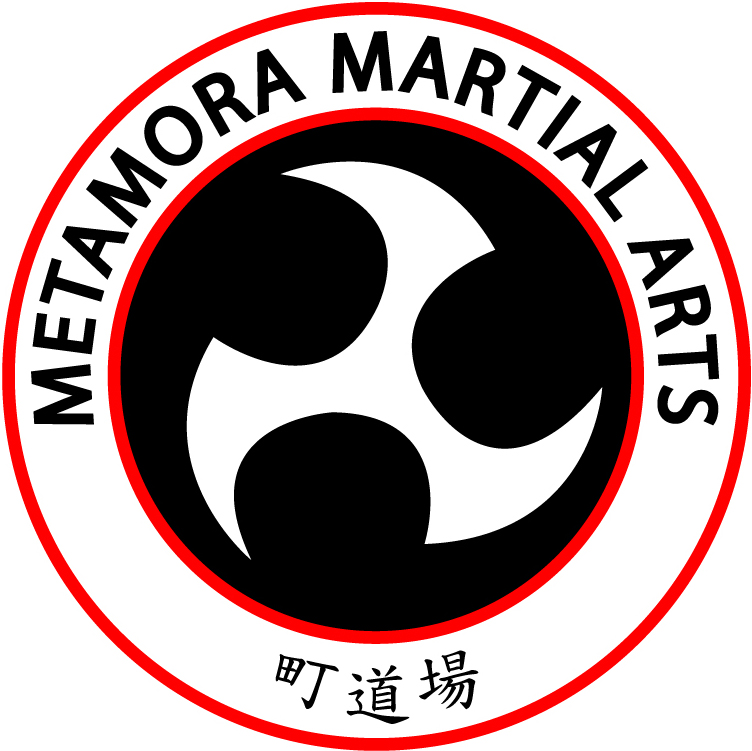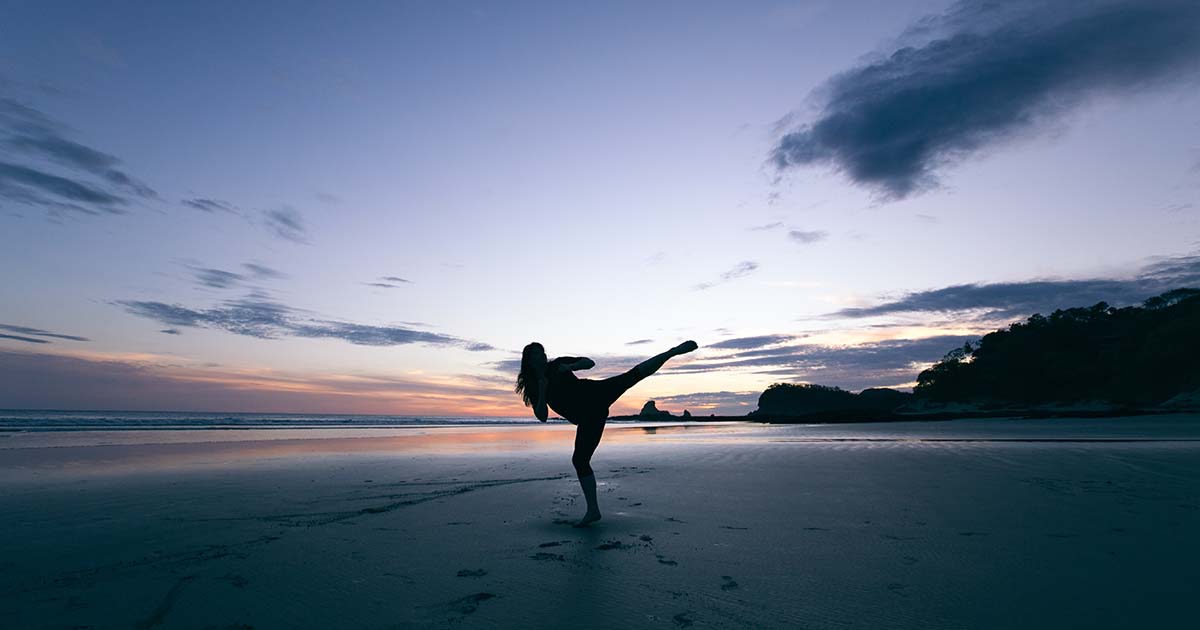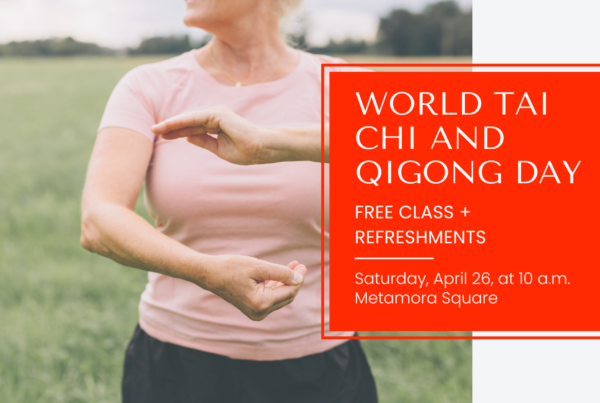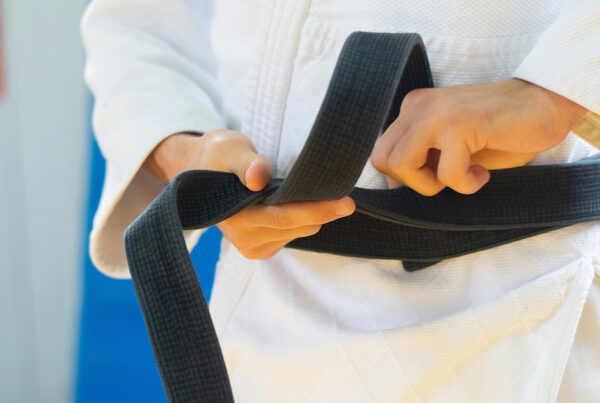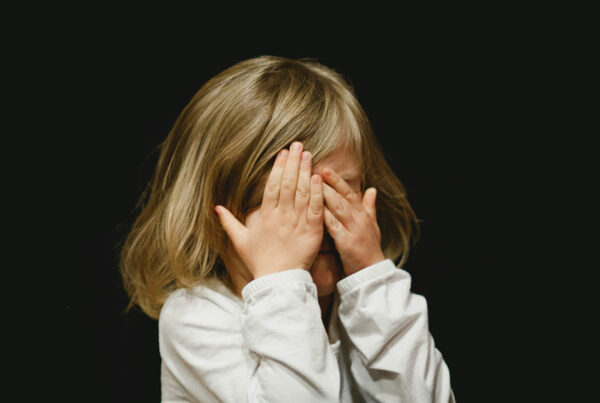One of the underlying components of a successful martial arts program is developing character.
Often, character-building is guided by a dojo kun.
In this post, we’ll look at the general idea behind a dojo kun, and what we practice specifically in our program.
What Is A Dojo Kun?
The term dojo kun in Japanese means “training hall rules.”
In other words, it contains the types of behavior that are allowed and expected both inside and beyond dojo walls.
It’s no different than school, work, or home—each space has a set of rules that goes along with it.
A martial arts school, or dojo, is no different.
Whether it’s school, work, or home, chances are that space will have tolerated behavior.
The basic philosophy of the dojo kun is to provide students and the martial arts school with values that can be used for more than just karate practice.
Some schools reinforce the dojo kun tenets by hanging it up in the dojo, and/or by reciting it before or after class.
The Metamora Martial Arts Dojo Kun
Our dojo kun contains four lines:
- I will behave in a manner that will reflect honor upon myself and my school.
- I will be open-minded to the study of all martial arts and will never stop learning and seeking new knowledge.
- I will be honest and exercise integrity to develop community, cooperation, and trust with my fellow students and my teachers.
- I will exercise restraint in the use of my martial arts knowledge, employing it only in fair competition or in defense of my life, my loved ones, or my country.
Let’s now look at each line individually, and I’ll share which words stand out to me.
I will behave in a manner that will reflect honor upon myself and my school.
Two words stand out to me in this line: behave and honor.
To behave means to act in a particular way.
Honor, in this sense, means upholding a reputation or sticking to a code of values.
Metamora Martial Arts students—and by association, their parents—are expected to abide by the dojo kun.
Here’s one example of where this line could impact you or our program.
We’ve all heard the saying, “Don’t judge a book by its cover.”
But sometimes, the cover is all we have.
Let’s say that you’re driving your student to class.
As you’re pulling into the parking lot, another person backs their car out with seemingly no regard for you.
You slam on your brakes, press your horn, and start shouting about the other driver’s carefree driving abilities.
The car eventually gets out of the way, and you park your car in a huff.
As you look down the road, you still see the car, so you flip the bird.
Meanwhile, someone else nearby has seen this whole exchange from a distance and views you as the aggressor in this situation.
They might see you walking into a martial arts school, and they might start to form a perception about what’s really taught behind those doors.
After all, the book cover is all you’ve given them.
To boil down line 1 of the dojo kun, the terms “behave” and “honor” stand out.
I will be open-minded to the study of all martial arts and will never stop learning and seeking new knowledge.
If I had to pick out two key ideas here, I would pick open-mindedness and learning.
To be open-minded means you are receptive to new ideas or perspectives.
And, learning happens when you earn a new skill through instruction or study, and adjust what you do as a result of the learning.
Let’s look at each term individually.
Open-mindedness can be demonstrated by attending a martial arts competition.
In my experience, in this part of Illinois, most competitions heavily feature taekwondo athletes.
Karate students or parents believe that karate is inherently better because it’s your art.
You may also wonder: “Which is better? Karate or taekwondo?”
The answer is: Neither!
A martial arts school is only as good as the instructor teaching the classes, regardless of style.
Just like there is more than one type of vehicle you can drive, there is more than one type of martial art you can learn.
Being open-minded also suggests a student or parent is open to learning new things.
I’ll give a personal example here.
When I was in college, I had practiced karate for about seven years.
However, my class schedule made it impossible to meet up with the Metamora Martial Arts class schedule.
I reached out to my sensei for suggestions on how to continue my training.
I went on a tour of martial arts schools throughout central Illinois, where I was exposed to grappling, haganah, and more.
Ultimately, I landed on a hidden gem of a tai chi chuan class taught at the time on Farmington Road.
As of this writing, I have continued with that class and my sifu for more than 10 years.
All because I was open-minded to all martial arts and vowed never to stop learning and seeking new knowledge.
I will be honest and exercise integrity to develop community, cooperation, and trust with my fellow students and my teachers.
Line 3 discusses many important components of not only successful karate training but life preparation:
- Honesty – Factual, straightforward. Not telling lies.
- Integrity – As discussed with the term honor above, adhering to a set of values.
- Community – A group of people who share common interests, like martial arts.
- Cooperation – Being helpful by doing what is expected. In other words, if I instruct you to punch toward your partner’s chest but not hit them, don’t hit them.
- Trust – Using the cooperation line above, knowing that your partner will attack hard and fast but won’t hurt you as a result.
I will exercise restraint in the use of my martial arts knowledge, employing it only in fair competition or in defense of my life, my loved ones, or my country.
Martial arts teach you incredibly powerful tools for self-defense.
So powerful are these tools that they can result in torn ligaments and tendons, broken bones, and even death.
As a result, we need to restrain ourselves in how we use it.
We should demonstrate an ability to keep ourselves under control.
The only acceptable reason to use martial arts outside of the dojo is to protect the well-being of yourself, your friends and family, or your country, if you enlist in the military.
And that’s the dojo kun.
These four lines have had a profound impact on my life over the last 20 years, and I hope they’ll help guide yours, as well.
Photo by Jason Briscoe on Unsplash
